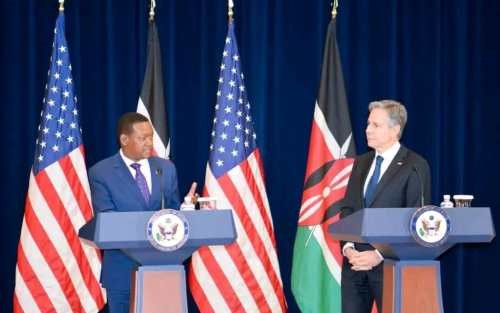Kenya and the United States (US) on Tuesday, April 25 agreed to strengthen their cooperation in five sectors to enhance strategic partnership and advance peace and prosperity in Kenya, Africa, and beyond.
In a statement, the US Department of State said US-Kenya strategic partnership is grounded in mutual cooperation, respect, and a common vision for sustainable development.
In the first pillar, the two countries committed to further increase two-way trade and investment cooperation through the Kenya-US Strategic Trade and Investment Partnership and by prioritizing economic and commercial programs.
"Through these joint efforts, the United States and Kenya seek to work to create at least one million new jobs per year in Kenya and greatly reduce food insecurity over the next five years," the statement read in part.
In the second pillar, the US and Kenya renewed their commitment to implement instruments signed during the 2022 Bilateral Defense Forum, including a five-year security cooperation plan to enhance Kenya’s capabilities to counter violent extremist organizations, promote regional security, advance maritime surveillance, and bolster Kenyan military academic institutions.
"The United States commended Kenya for its role in enhancing stability in Somalia and the Democratic Republic of the Congo. The United States will – in support of these peace efforts – seek to increase the military aviation capabilities of the Kenya Defence Forces," the statement said.
Kenya, US on democratic principles
In the third pillar, the two nations underscored their respect for democratic principles and highlighted Kenya’s free and fair 2022 elections which were credible and peaceful as well as its democratic transition.
"The two governments renewed their commitment to fostering accountable and effective democratic institutions; strengthening the rule of law and respect for human rights; and addressing governance and fiscal transparency.
"The United States committed to continue to support Kenya’s efforts to strengthen police reforms and accountability," the joint statement stated.
In the area of multilateral and regional issues, the two countries pledged to continue to work together to address instability in the Horn of Africa and beyond, including to respond to the growing humanitarian needs stemming from food insecurity and forced displacement.
"The United States pledged to continue to assist Kenya as it responds to the unprecedented drought and resulting food insecurity, highlighting the more than $500 million in humanitarian assistance the United States has provided over the last year," the statement said.
In the health sector, the two nations noted the longstanding US-Kenya health partnership has made significant progress in combatting communicable and non-communicable diseases.
"There are ongoing collaborations in strengthening health systems and management of HIV, TB, malaria, immunization, family planning, and reproductive, maternal, newborn, child, and adolescent health (RMNCAH).
"Through the President’s Emergency Plan for AIDS Relief (PEPFAR) and the Ministry of Health’s combined efforts, Kenya is on track to achieve President Ruto’s goal of HIV/AIDS epidemic control by 2025 and sustained epidemic control that is Kenya-owned, Kenya-driven, and Kenya-funded," it added. By Evans Maritim, PD






